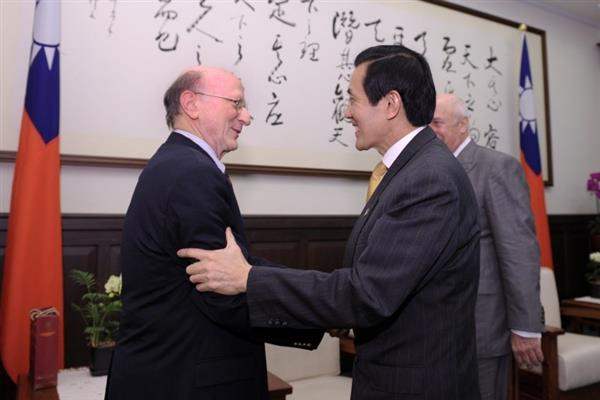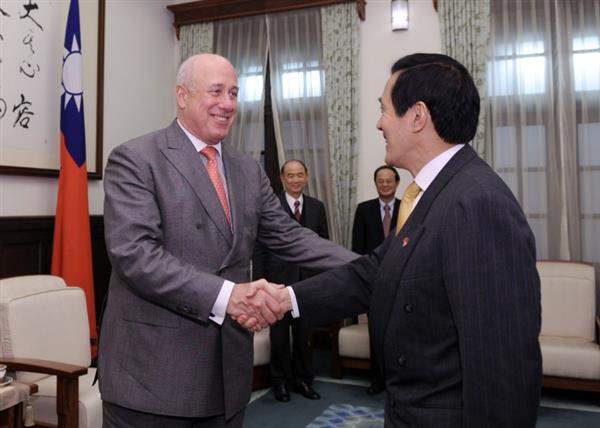News & activities
 News releases
News releases
President Ma Ying-jeou on the afternoon of February 11 at the Presidential Office met with Douglas H. Paal, vice president for studies at the Carnegie Endowment for International Peace, and Alan D. Romberg, director of the East Asia Program at the Henry L. Stimson Center. The president and the guests exchanged opinions on a wide range of topics of mutual interest.
The president noted that Mr. Paal and Mr. Romberg in the past both served in important posts in the United States government. Both are familiar with Taiwan affairs, can speak Chinese, and have good friendship with many people in Taiwan. He furthermore said he is deeply pleased that the two are able to visit Taiwan during the Lunar New Year period.
President Ma remarked that during mainland China leader Hu Jintao’s visit to Washington, D. C., US President Barack Obama expressed support for the improvement in cross-strait relations and applauded the signing of the cross-strait Economic Cooperation Framework Agreement. President Ma expressed his appreciation for this stance and stressed that the ROC government has made every effort over the past two-plus years to reach this objective. He said he hopes that greater economic, trade, and cultural exchanges between the two sides will provide a new momentum for peace. At the same time, President Obama at a joint press conference with his mainland Chinese counterpart reiterated that the United States will adhere to the Taiwan Relations Act. This signifies that the United States will continue to engage in cooperation in military affairs with Taiwan, President Ma said.
The president added that he specially reiterated the importance to Taiwan of the "six pledges" (made by the Reagan administration in 1982) when he met with American Institute in Taiwan Chairman Raymond F. Burghardt the other day. In particular, amid the military imbalance between the two sides of the Taiwan Strait, President Ma said he hopes the United States will sell Taiwan F-16 C/D fighter jets and diesel-powered submarines. These are vital to Taiwan's defense, he stated, adding that all of the weapons procured by Taiwan are defensive in nature and that the purpose of these arms is to replace aging equipment.
President Ma expressed his hopes that progress can be made on signing an extradition treaty with the United States and that Taiwan will be included in the US Visa Waiver Program. As for negotiations on a Trade and Investment Framework Agreement, the president admitted that various difficulties have emerged due to issues related to US beef imports. Officials here fully understand the situation and efforts will continue to be made to resolve them, he explained.
The president stressed that, broadly speaking, cooperation between Taiwan and the United States is progressing smoothly. While a few minor issues do need to be addressed, both sides are sincere in seeking to resolve them. President Ma said he is confident that the relations will become stronger in the future. He also voiced his hopes that the United States will dispatch high-ranking officials to Taiwan so that opinions can be exchanged at a higher level.
The guests were accompanied to the Presidential Office in the afternoon by Vice Minister of Foreign Affairs Ssu-Tsun Shen to meet President Ma. Also attending the meeting was National Security Council Secretary-General Hu Wei-jen.




